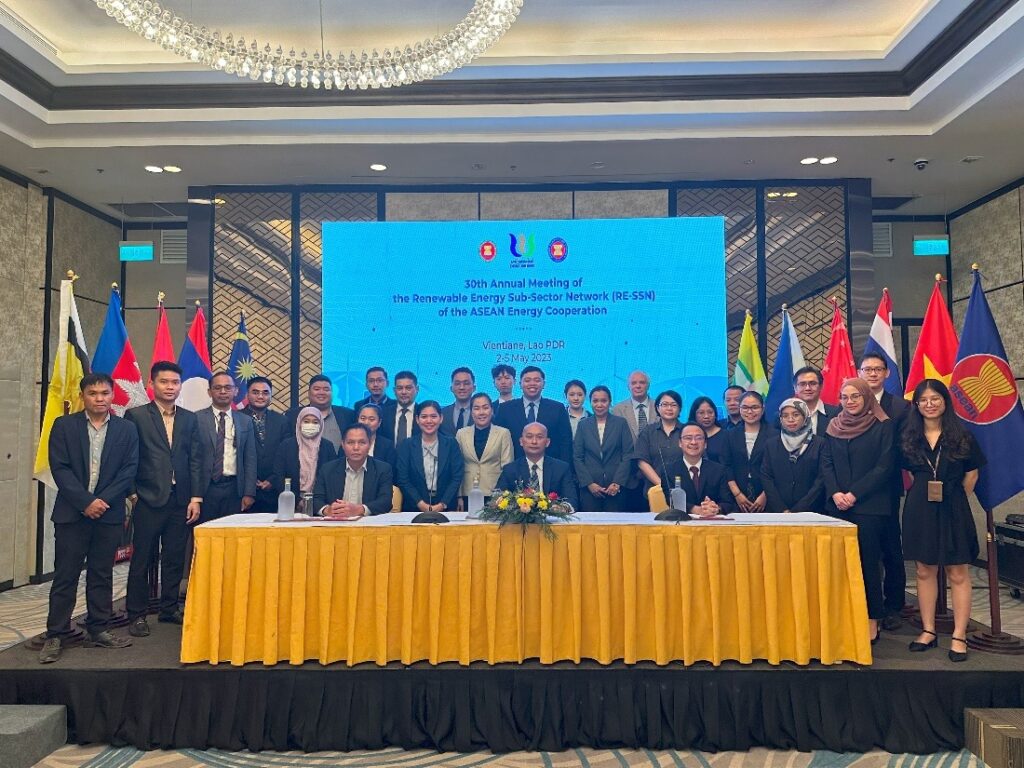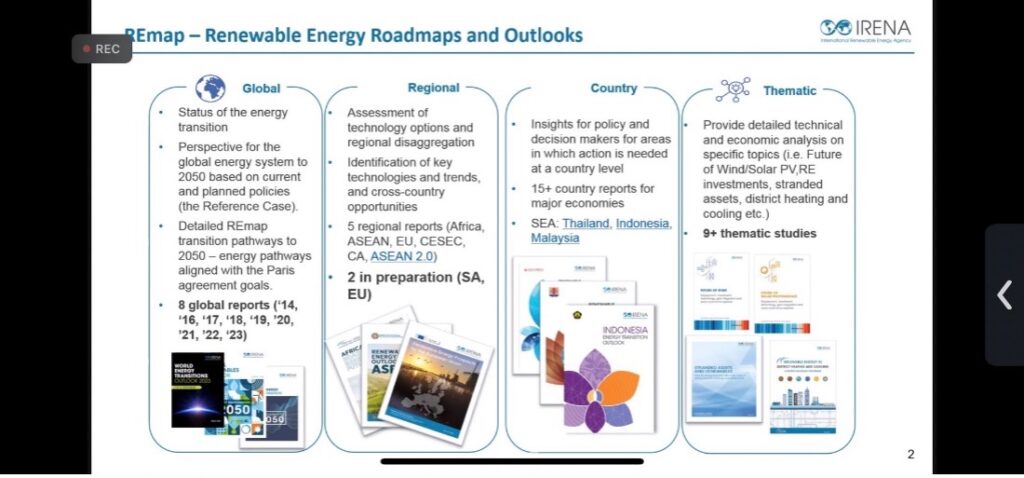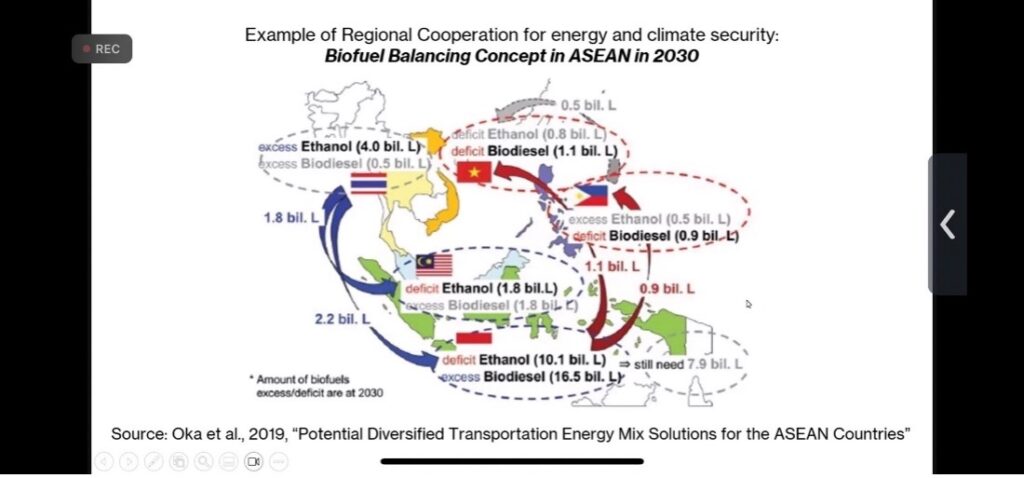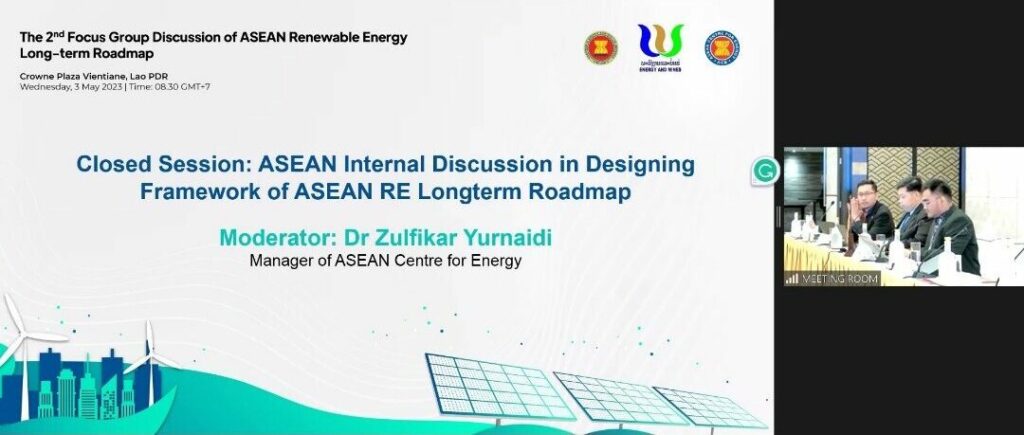Menu

Photo 1. The Group Photo of the Lao PDR Host, RE-SSN Chair, and representatives from ASEAN Member States, ASEAN Secretariat, and ASEAN Centre for Energy (ACE) in the 2nd Focus Group Discussion (FGD) on ASEAN Renewable Energy Long-term Roadmap
Following up the contributions made through the 1st Focus Group Discussion of ASEAN Renewable Energy Long-Term Roadmap on 12 May 2022, the 2nd Focus Group Discussion of ASEAN Renewable Energy Long-Term Roadmap was held on 3 May 2023 in Vientiane, Lao PDR as one of the side-event of the 30th Renewable Energy Sub-Sector Network (RE-SSN) Annual Meeting. The FGD aimed to evaluate the findings of the ASEAN Renewable Energy (RE) Approach through multiple aspects; review the alternative scenarios and pathways from ASEAN member states’ roadmap, the 7th ASEAN Energy Outlook (AEO7), UNESCAP’s SDG7 roadmap, and IRENA’s net zero scenarios; identify the utilisation and RE potential gap; and learn the emerging economic models to maximise RE penetration in ASEAN. The outcome of the FGD will be developed to finalise the ASEAN RE Long-term Roadmap, which is expected to be launched at the 41st ASEAN Minister of Energy Meeting (AMEM) in August 2023.
The FGD commenced with the opening remarks of Mr Khammanh Sopraseurth, Deputy Director General, Department of Energy Efficiency and Promotion, Ministry of Energy and Mines as the representative of the Host Country, Mr Mohd Erwan Misran, Deputy Undersecretary for Renewable Energy, Ministry of Natural Resources, Environment, and Climate Change, Malaysia on behalf of the RE-SSN Chair, Mr Michael Williamson, Section Chief of Energy Division of UNESCAP, and Mr Christopher G Zamora, Senior Manager of ASEAN Centre for Energy (ACE) on behalf of Dr Nuki Agya Utama, Executive Director of ACE.
 Photo 2. Ms Monika Merdekawati’s presentation
Photo 2. Ms Monika Merdekawati’s presentation
The open session of the FGD was titled “Insights from Various Studies Strategic Approach for Effective RE Expansion in ASEAN”, moderated by Mr I Dewa Made Raditya Margenta, Research Analyst of ACE. The first speaker of the session, Ms Monika Merdekawati, Research Analyst of ACE, briefly introduced vital findings from one of ACE’s latest publications Renewable Energy Regional Approach Technical Report, which has laid the foundation for the development of near-, medium-, and long-term targets for ASEAN RE Long-term Roadmap. In the presentation, she presented the current energy status and the SWOT analysis for ASEAN and each ASEAN Member States (AMS) before preliminary identifying respective priorities for different phases in ASEAN RE Long-term Roadmap. Ms Merdekawati also emphasised that RE regional integration requires the collaboration of each member, especially in policy, energy, trade, and environment, noting that regional integration will not be beneficial unless each AMS has adequate infrastructure to support it.
 Photo 3. Mr Anis Zaman’s presentation
Photo 3. Mr Anis Zaman’s presentation
The open session was continued with a presentation delivered by Mr Anis Zaman, Energy Division Officer of the Economic and Social Commission for Asia and the Pacific (UNESCAP), on the topic of “SDG7 Roadmap of Selected ASEAN Member Countries.” Mr Zaman reported that UNESCAP had developed a tool to support the development of a national SDG7 roadmap named the National Expert SDG Tool for Energy Planning (NEXSTEP). NEXSTEP consists of three main steps: energy emissions and investment, economic analysis of the scenario, and policy analysis, which results in policy recommendation as an output. Furthermore, Mr Zaman elaborated on NEXSTEP’s key findings and policy recommendations for some ASEAN Member States.
 Photo 4. Ms Badariyah Yosiana’s presentation
Photo 4. Ms Badariyah Yosiana’s presentation
The third speaker of the session was Ms Badariyah Yosiana, Programme Officer Southeast Asia of the International Renewable Energy Agency (IRENA). Ms Yosiana explained how IRENA had supported the Southeast Asian region to develop roadmaps through the Renewable Energy Outlook for ASEAN and Indonesia and Malaysia Energy Transition Outlook. Following up on the elaboration on the ASEAN Outlook, Ms Yosiana highlighted the importance of the 1.5°C Scenario (1.5-S) and the key actions to achieve 1.5-S by 2050 in ASEAN. These key actions include clean electricity, maximising indigenous use of renewables, sustainably scale investment, electrifying end-uses, energy efficiency, and investing in disruptive technologies and carbon management solutions.

Photo 5. Dr Francis X Johnson’s presentation
As the fourth speaker, Dr Francis X. Johnson, Senior Research Fellow of Stockholm Environment Institute (SEI), addressed “Bioenergy, Bioeconomy, and Climate Resilience in Southeast Asia: Challenges and Opportunities.” Dr Johnson presented various relevant data on the topic, which proves the urgent need for profound emissions reduction across all sectors, the different transformations that emission reductions imply in the global North and the global South, the connection of land use and biomass transition with a long-term shift to a renewable and sustainable economy, and the possibility for mitigation-adaptation synergy of land sectors. Dr Johnson then explained the current data related to ASEAN countries’ land use and an example of regional cooperation for energy and climate security through the biofuel balancing concept in ASEAN by 2030.

Photo 6. Closed session on the “ASEAN Internal Discussion in Designing Framework of ASEAN RE Long-term Roadmap”
Next, the closed session on “ASEAN Internal Discussion in Designing Framework of ASEAN RE Long-term Roadmap” was led by Dr Zulfikar Yurnaidi, Manager of ACE, as the moderator. In this session, further in-depth questions, inquiries and feedback from the participants have been gathered to define the long-term RE regional target, priorities of each strategic vital pillar, and regional commitment on cross-cutting issues, such as coal phase-out, international support, monitoring and evaluation scheme.
Finally, Mr Christopher G. Zamora, Senior Manager of ASEAN Centre for Energy, delivered the closing remark. He expressed his sincere gratitude to the Ministry of Energy and Mines of Lao PDR as the Host, the RE-SSN Chairman, AMS Focal Points, and representatives from UNESCAP, IRENA, and SEI for actively participating in this FGD. Mr Zamora acknowledged the fruitful discussion among the participants, with the inputs and suggestions for developing the ASEAN RE Long-term Roadmap. He also highlighted the immense RE potential of the region and the importance of establishing ambitious yet realistic RE targets through this roadmap. He expressed his enthusiasm for the upcoming progress and activities.
To learn more about the ASEAN Renewable Energy Long-term Roadmap, visit the links below.
1. The 2nd Focus Group Discussion of ASEAN Renewable Energy Long-term Roadmap
2. ASEAN Centre for Energy’s related recent publication
3. The 30th RE-SSN Meeting and other Associated Meetings:
